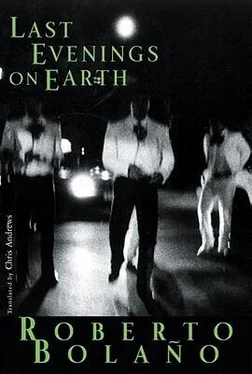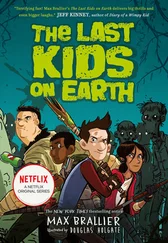By chance, I replied. For a while none of us said anything. I considered the possibility of taking a job in Gуmez Palacio and staying there for the rest of my life. I had noticed a pair of pretty girls among the painting students in the yard. With a bit of luck I might manage to marry one of them. The prettier one also seemed to be the more conventional. I imagined a long, complicated engagement. I imagined a dark, cool house and a garden full of plants. And how long do you think you'll go on writing? asked the boy who worked in the soap factory. I could have said anything, but opted for simplicity: I don't know, I said. What about you? I started writing because poetry sets me free, sir, and I'm never going to stop, he said with a smile that barely hid his pride and determination. As an answer it was too vague and declamatory to be convincing, yet somehow it gave me a glimpse of the factory worker's life, not as it was then, but the life he had led at the age of fifteen, or maybe twelve. I saw him running or walking through the outskirts of Gуmez Palacio, under a sky that looked like a rockslide. I saw his friends and wondered how they could possibly survive. Yet, one way or another, they probably would.
Then we read some poems. The only one who had any talent was the girl. But by then I wasn't sure of anything. When we came out of the classroom, the director was waiting with two guys who turned out to be civil servants employed by the state of Durango. For some reason my first thought was, They're policemen, here to arrest me. The kids said good-bye and off they went, the skinny girl with one of the boys and the other three on their own. I watched them walk down the hallway with its peeling walls. I followed, as if I had forgotten to say something to one of them. And from the door I saw them disappear at both ends of that street in Gуmez Palacio.
The director said: She's my best friend. That was all. The highway was no longer a straight line. In the rearview mirror I could see an enormous wall rising beyond the town. It took me a while to realize it was the night. The singer on the cassette began to warble another song. The lyrics were about a remote village in the north of Mexico where everyone was happy, except her. I had the impression the director was crying. Silent, dignified, unstoppable tears. But I couldn't confirm this impression. I had to keep my eyes on the road. The director took out a handkerchief and blew her nose. Switch on the headlights, I heard her say in a barely audible voice. I kept on driving.
Switch on the headlights, she repeated, and without waiting for an answer she leaned forward and did it herself. Slow down, she said after a while, her voice stronger now, as the singer reached the final notes of her song. What a sad song, I said, just for something to say.
The car came to a halt by the side of the road. I opened the door and got out. It wasn't yet completely dark, but it was no longer day. The land all around us and the hills into which the highway went winding were a deep, intense shade of yellow that I have never seen anywhere else. As if the light (though it seemed to me not so much light as pure color) were charged with something, I didn't know what, but it could well have been eternity. I was immediately embarrassed to have had such a thought. I stretched my legs. A car whizzed past honking its horn. I told him where to go with a gesture. Maybe it wasn't just a gesture. Maybe I yelled, Go fuck yourself, and the driver saw or heard me. But it's unlikely, like most things in this story. In any case, when I think about the driver all I can see is my own image frozen in his rearview mirror: my hair is still long; I'm thin, wearing a denim jacket and a pair of awful, oversize glasses.
The car pulled up several yards in front of us. The driver didn't get out, or reverse, or honk the horn again, but his mere presence strained the space that we were now, in some sense, sharing with him. Cautiously, I walked around to the director's side of the car. She rolled down her window and asked me what had happened. Her eyes were bulging more than ever. I said I didn't know. It's a man, she said, and slid across into the driver's seat. I got into the seat she had left empty. It was hot and moist, as if the director had a fever. Through the windshield I could see the man's silhouette, the nape of his neck; like us he was looking forward, at the line of the highway beginning to wind its way towards the hills.
It's my husband, said the director with her eyes fixed on the stationary car, as if she were talking to herself. Then she flipped the cassette over and turned up the volume. Sometimes my friend calls me up, she said, when she's touring in towns she doesn't know. Once she phoned from Ciudad Madero. She'd been singing all night at the Oil Workers Union building and she called me at four in the morning. Another time she phoned from Reinosa. That's nice, I said. Not especially, said the director. She just calls. Sometimes she needs to talk. If my husband answers, she hangs up.
For a while neither of us said anything. I imagined the director's husband with the telephone in his hand. He picks up the telephone, says, Hello, who is it? Then he hears someone hang up on the other end and he hangs up too, almost by reflex. I asked the director if she wanted me to get out and say something to the driver of the other car. There's no need, she said. Which seemed a reasonable answer to me, although in fact it was crazy. I asked her what her husband was going to do, if it really was her husband. He'll stay there until we go, said the director. Then we better go right away, I said. The director seemed to be lost in thought, although much later I surmised that, in fact, all she was doing was shutting her eyes and listening to her friend from Durango, drinking that song down to the very last drop. Then she turned on the ignition, pulled out slowly and passed the car parked several yards ahead. I looked out the window as we went by, but the driver turned his back to us and I couldn't see his face.
Are you sure it was your husband? I asked as we sped off again toward the hills. No, said the director, and started laughing. I don't think it was. I started laughing too. The car looked like his, she said, almost choking with laughter, but it probably wasn't him. So it might have been? I said. Not unless he's changed his license plate, said the director. At which point I understood that the whole thing had been a joke. I shut my eyes. Then we came out of the hills and into the desert: a plain swept by the headlights of cars heading north or back toward Gуmez Palacio. It was already night.
Now we're coming to a very special place, said the director. Those were her words. Very special.
I wanted you to see this, she said proudly, this is why I love it here. She pulled over and stopped in a sort of rest area, although it was really no more than a patch of ground big enough for a truck to park on. Lights were sparkling in the distance: a town or a restaurant. We didn't get out. The director pointed in the direction of something — a stretch of highway that must have been about three miles from where we were, maybe less, maybe more. She even wiped the inside of the windshield with a cloth so I could see better. I looked: I saw the headlights of cars. From the way the beams of light were swiveling, there must have been a bend in the highway. And then I saw some green shapes in the desert. Did you see that? asked the director. Yes, lights, I replied. The director looked at me: her bulging eyes gleamed, as do, no doubt, the eyes of the small mammals native to the inhospitable environs of Gуmez Palacio in the state of Durango. Then I looked again in the direction she had indicated: at first I couldn't see anything, only darkness, the sparkling lights of that restaurant or town, then some cars went past and the beams of their headlights carved the space in two.
Читать дальше












